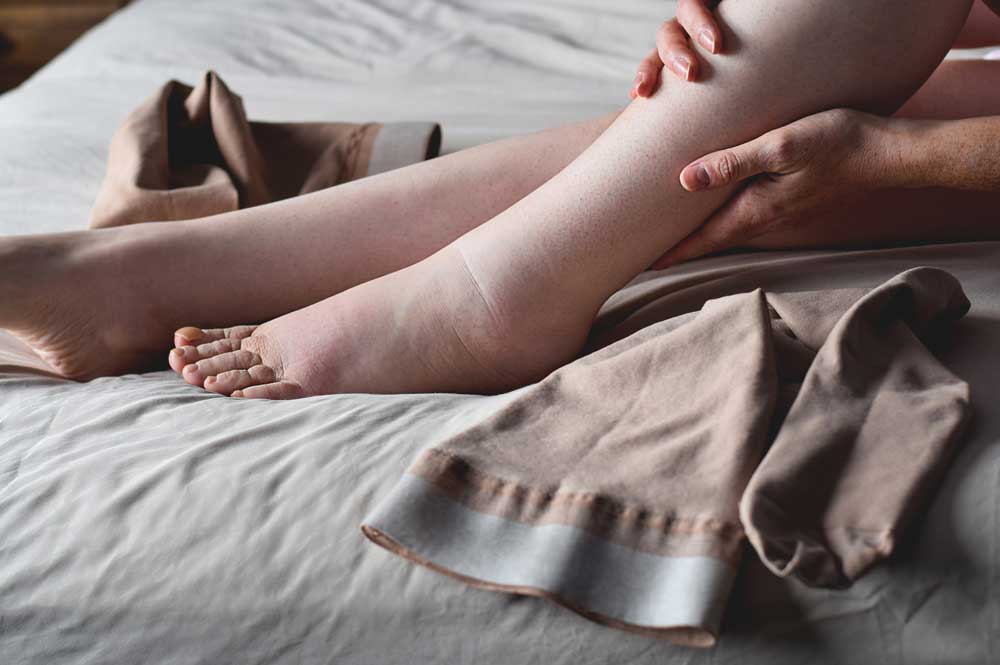What Is DVT?
Deep vein thrombosis is a blood clot in a deep vein , usually in the thigh or lower leg. The main concern is if the DVT breaks free and travels through your bloodstream to the lung, causing a life-threatening complication known as a Pulmonary Embolism (PE).
What Are The Signs Of A Blood Clot?
With DVT, the signs of a blood clot could be related to the blood clot itself or due to the blood clot traveling. However, only about 50 percent of people with DVT notice any symptoms. You may notice swelling along a vein in your leg, and your leg may feel tender when you stand or walk. In addition to skin redness, you may notice increased warmth when you touch the leg.
What Causes Blood Clots?
Clotting problems happen when your body’s natural clotting processes are overly triggered. This can happen due to chronic health problems, hormones, medications and lifestyle. These include, but aren’t limited to:
- Arteriosclerosis
- Pregnancy
- Recent Surgery
- Decreased physical activity
- Heart problems
- Obesity
- Smoking
Does DVT Hurt?
In many cases, people do not see or feel DVT clots. Although it is usually painless, you may feel leg tenderness when you stand or walk. In some cases, the pain may persist up to a year after the blood clot resolves. For others, leg pain is present and feels like cramping. In some cases, the patient’s ability to walk is affected.
Can DVT Be Cured?
There is no cure to eliminate DVT completely. However, there are treatment options available. These options include dissolving the clot, removing the clot or allowing the body’s natural mechanism to resolve them. A vein specialist can help you choose the right treatment for you.
Can Blood Clots Go Away On Their Own?
A deep vein clot will gradually resolve as the body’s natural mechanisms break it down.. One of the main concerns is to prevent additional clots from forming. If you suspect a DVT, seek treatment immediately. If you have a family history of DVT, blood clots or venous disease, schedule routine checkups with a vein specialist to monitor your vein health.
How Does DVT Cause Pulmonary Embolism?
DVT causes a pulmonary embolism (PE) when the blood clot breaks free and travels through the bloodstream to the lungs. This life-threatening blockage affects healthy breathing. If you suspect DVT, it’s vitally important to have it diagnosed and managed by a medical professional before the clot breaks free and travels through the bloodstream, putting your life at risk.
Are Blood Clots Common After Pregnancy?
Pregnant women are four times more likely to develop blood clots, and this risk increases more during the twelve weeks following delivery. Pregnancy hormones increase the blood’s ability to clot in order to manage blood loss during and following delivery. While this is important to prevent too much blood loss during the delivery process, a side effect is that many women will develop blood clots in the deep vein. The risks are higher if the mother-to-be is placed on bed rest or travels frequently.
How Can Blood Clots Be Detected?
If you have a blood clot, it can be detected with an ultrasound, a blood test, a dye injection test, an MRI or a CT. If you suspect a blood clot, a physician can employ one or more of these tests to detect your DVT and immediately begin treatment. The most simple, and readily available method used to test today is an ultrasound.
How Can Blood Clots Be Treated?
Your treatment plan may include the use of compression stockings, anti-coagulant medications and/or injections into the veins to dissolve the clot. Patients who cannot take anticoagulants or who develop a PE despite anti-coagulants may have a filter placed in the vena cava to prevent the clot from traveling to the lungs. Stents may also be placed into the veins that are scarred from previous clots. Patients with a history of DVT may also receive anticoagulants to prevent future blood clots.
How Can Blood Clots Be Prevented?
Top tips for preventing blood clots include:
- Having a checkup with a vein specialist if you have vein problems or a family history of venous disease or blood clots
- Maintaining a healthy weight and staying active.
- Wearing compression hose and stretching frequently if you have long periods of sitting or standing or are taking a long flight.
Don’t Wait For An Emergency
If you suspect a blood clot or DVT, or want to find out how you can help prevent blood clots and venous disease, Vein Specialists of the South can help. Please contact us right away for a consultation.









